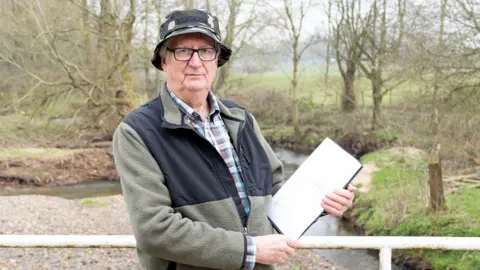UK farmers call for weedkiller ban over Parkinson’s fears
 BBC
BBCSome British farmers are calling for a ban on the UK production of toxic weedkiller Paraquat, saying studies suggest it could be a factor in the onset of Parkinson's Disease. It comes as hundreds of US farm workers pursue a legal case against its manufacturer, alleging it knew the risk and failed to warn them.
Andy Pollard was once a farm manager who could leap into his tractor cab. But now his limbs are rigid and his body contorts with spasms. He has advanced Parkinson's Disease, and can no longer control his own movements.
He spent decades spraying herbicides on his land and, unaware of any danger, didn't use protective equipment.
"Paraquat was a really good thing to use - or so we thought," his wife Sue says. "Andy would be driving around the fields and the spray would be going everywhere."
She had thought it was a coincidence that the only people she knew with Parkinson's were farm workers, then read about the potential connection with the chemical.
"Why hasn't it been regulated and stopped?" she asks. "We've got a lot of people in the same situation."
 Getty Images
Getty ImagesParaquat was first manufactured in the UK in the early 1960s and is sold globally - 377 companies have registered it for sale.
It is one of the world's most popular and effective herbicides, millions of farmers have used it to kill weeds. But it is also one of the most dangerous and has caused thousands of poisoning deaths.
Its manufacturer Syngenta says claims of a link between Paraquat and Parkinson's are not supported by scientific evidence, stating it has undergone more than 1,200 safety studies.
Andy regularly visits a Dorset farm run by charity Countrymen UK, founded by Julie Plumley after her father John was diagnosed with Parkinson's.
The 30-acre working farm sells beef and lamb. In the yard, instead of tractors is a fleet of mobility scooters. "The farmers come here not because they're ill," Julie explains, "but because they want to get on with living."

Parkinson's Disease is believed to be the world's fastest-growing neurological condition. It affects neurons in a specific area of the brain called the substantia nigra.
It is degenerative, gradually leading to tremors and stiffness in the limbs. Global studies show rural, agricultural areas often have higher rates of the disease.
Julie explains her childhood farm was owned by the local council, so her father had to meet certain conditions. "He had to use chemicals, because if you got too many dock leaves or thistles, they could take money away from you. Paraquat was the pesticide all the farmers used."
He would carry a backpack filled with the chemical and spend hours hand-spraying the fields. "He would have his sleeves rolled up, his arms bare, the liquid dripping down."
John developed the disease in his 40s and always believed there was a connection to the chemicals. His suspicion deepened when his neighbour Ken Barnes was diagnosed around the same time - he was also in his 40s and had also been using Paraquat for years.

Ken now visits Julie's farm. He has a twinkle in his eye, but his clarity of speech has gone. "It's a horrible disease," says his wife Sue. "It's taken his life away."
She says its manufacture in the UK and export should be stopped. "I wouldn't want my son, who's got farming qualifications, ending up like his father."
Paraquat has not been authorised for use in the EU since a court ruling in 2007. That is still the case in the UK after Brexit but it is still made - under the brand name Gramoxone - at Syngenta's plant in Huddersfield. It is exported to countries such as the US, Japan and Australia, with a fifth of exports going to the developing world.
In the US, nearly 900 farmers and field workers have joined forces to sue the manufacturer, claiming not only is there a link between Paraquat and Parkinson's, but that Syngenta has deliberately hidden the health risks from the authorities.
Syngenta rejects the claims made in the remaining multidistrict litigation case, which is due to come to court later this year.
The company's most recent financial statement shows that the company has already paid $187.5m into a settlement fund. But it said the company believes that all of these claims are without merit and the payment is simply to keep the claims from going any further.
Toxicologist Prof Jon Heylings worked for Syngenta and its predecessor companies for more than 20 years. After retiring, he turned whistleblower, and has given evidence as an expert witness in the US legal action.
He said farmers who used it without protective equipment, damaging their skin, should be worried. "If they went out the next day and actually used it again, and the next day, you could absorb more Paraquat through the skin, into the blood and then into the brain," he says.
"The issue is really does it actually cause Parkinson's when it gets into the brain? That's one of the key issues around the whole exposure. And if this chemical does cause Parkinson's, who is responsible?"
There is no scientific consensus and many conflicting studies on any possible association between Paraquat and Parkinson's.
In the UK, research charity Cure Parkinson's said exposure was "a well-recognised environmental risk factor" but Parkinson's UK said studies show "a small increased risk" at most.
In the US, a 17-year-long study found Paraquat contributed to Parkinson's onset and progression. And research by the National Institute of Environmental Health Sciences - part of the US Department of Health - found people who used Paraquat developed Parkinson's two-and-a-half times more often than non-users.
But the US regulator, the Environmental Protection Agency, says an updated study couldn't replicate those results and no clear link was found.

But there are scientists who believe Syngenta is putting profit before product safety and public health.
Prof Heylings has a Syngenta regulatory strategy document from 2003 written while Paraquat was still being used by UK farmers. Its author acknowledges a growing number of studies "citing a correlation between incidence of Parkinson's Disease and herbicide use, including Paraquat".
He explains: "Syngenta are trying to influence researchers who are working on Paraquat and also influence the direction of the research because the last thing Syngenta wants is a big blow up on Parkinson's. So the strategy was to downplay anything to do with the potential neurotoxicity of Paraquat that could lead to Parkinson's."
It said: "In our view, Jon Heylings is technically not qualified to comment on Paraquat and Parkinson's Disease. He is certainly not aware of Syngenta's research on the issue, which was mostly conducted from 2008 onwards, after he left the company. We spent tens of millions of dollars investigating Paraquat and Parkinson's disease - and this figure doesn't include the monetary value of internal expert time."
In a statement, Syngenta said it had invested hundreds of millions of dollars over the product lifetime to ensure its safety.
"Paraquat has been the subject of more than 1,200 safety studies submitted to, and reviewed by, regulatory authorities around the world. Recent thorough reviews performed by the most advanced and science-based regulatory authorities including the United States and Australia continue to support the view that Paraquat is safe."
Photos by Claire Marshall
See the full story on Countryfile on BBC1 at 17:30 BST on 3 April and afterwards on the iPlayer.
